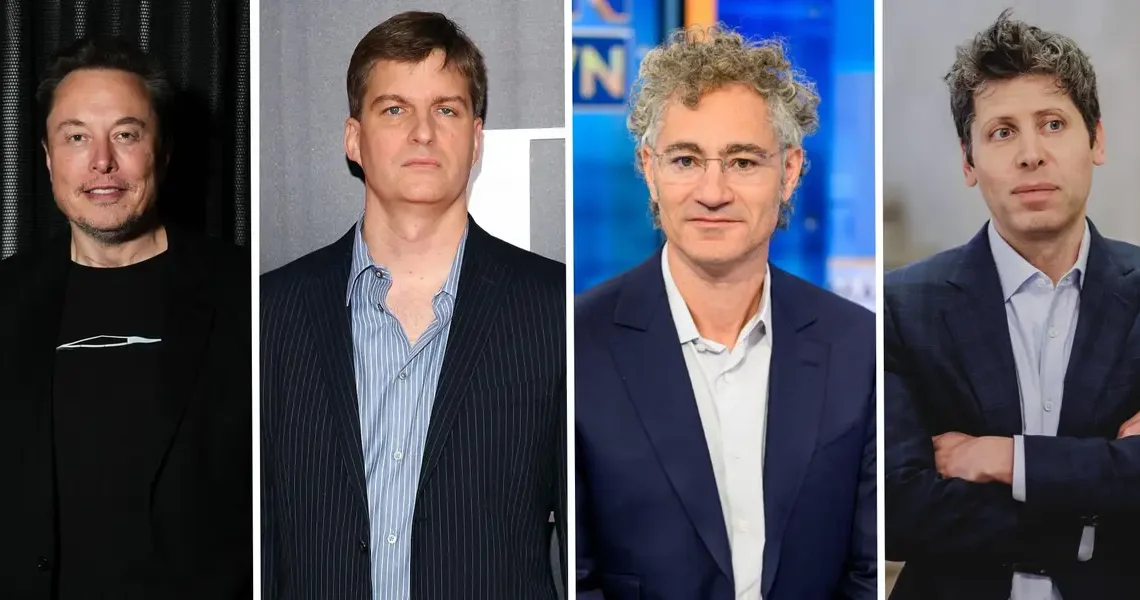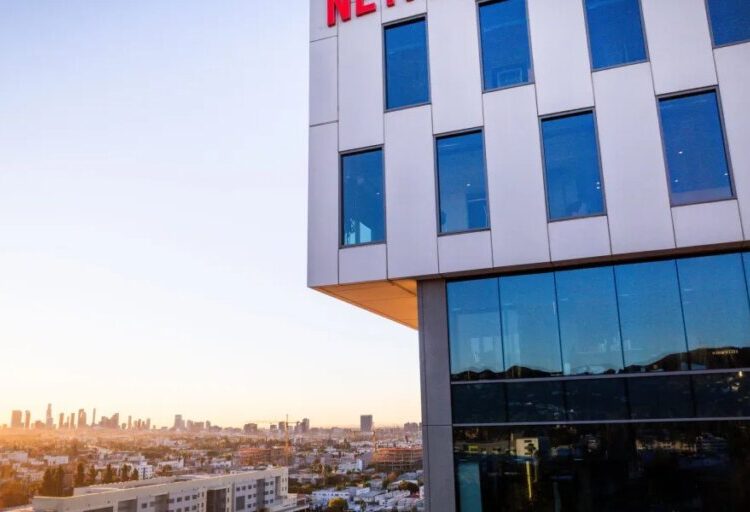Jared Siskin; Astrid Stawiarz; Roy Rochlin; Florian Gaertner/ Getty Images
Step aside, Elon Musk vs. Sam Altman. There’s a new beef in the business world, and it centers on the stock market’s biggest question: Is the AI boom a bubble?
Michael Burry of “The Big Short” fame and Palantir CEO Alex Karp have been trading barbs after the investor revealed he bet on Palantir’s stock to plunge last quarter.
The pair’s clash boils down to a fundamental difference in views that’s a microcosm of the market’s big divide.
Burry’s assessment is that AI is a bubble, and the valuations of companies like Palantir are way out of whack. Karp’s perspective is that Palantir is pioneering a technological revolution, its stock gains should be celebrated for enriching everyday Americans, and betting on his company to fail is just plain wrong.
The wider investing community is similarly split between those who say current valuations are justified because AI will change the world, boost productivity, and supercharge economic growth and corporate profits, and those who warn they’re overinflated and destined to burst like the dot-com bubble.
While Musk and Altman are wrestling over OpenAI, Burry and Karp’s dispute hinges on whether AI is worth every billion being thrown at it, or just the latest case of speculative fervor.
Inside Business is today’s must-read story on what the forces shaping business, tech, and innovation mean for you. Each piece delivers insights to help you make smarter career, money, and life decisions.
The long and short of Burry vs. Karp
The feud began with Burry’s Scion Asset Management disclosing last Monday that at the end of September, it held bearish put options on 5 million Palantir shares and 1 million Nvidia shares, worth a notional $912 million and $187 million, respectively.
Burry had returned to X a few days earlier after a two-year hiatus, posting a cryptic message suggesting AI hype is unsustainable — but so perilous that “the only winning move” is to not get involved.
He later posted an array of charts, book excerpts, and “Star Wars” memes drawing parallels between AI and the dot-com bubble.
Burry’s 13F filing was published on the same day as Palantir’s third-quarter earnings. Shares of the AI-powered data analysis company tumbled as much as 10% the next day, and Karp lashed out at Burry on CNBC.
“As far as I can tell, the two companies he’s shorting are the ones making all the money, which is super weird,” Karp said. “The idea that chips and ontology is what you want to short is batshit crazy.”
Burry fired back on X: “Doesn’t surprise me one bit that Alex Karp and his ‘ontology’ … cannot crack a simple 13F.”
Doesn’t surprise me one bit that Alex Karp and his “ontology” @PalantirTech cannot crack a simple 13F.
A fundamental principle of any rigorous ontological/epistemological model – whether philosophical or in data science – is recognizing when your information set is insufficient… pic.twitter.com/863pcAJSvG— Cassandra Unchained (@michaeljburry) November 10, 2025
The Scion boss — best known for his massive bet against the mid-2000s housing bubble, which was immortalized in “The Big Short” — was likely nodding to 13Fs being published with a six-week lag, so Karp had no firm reason to think Burry had kept his Palantir and Nvidia puts throughout October and early November.
Burry underscored that point in another X post : “Fake news! I am not 5’6” — meaning he’s not short, physically or in his portfolio.
Palantir stock has surged about 30-fold since the start of 2023, propelling it to a $453 billion market capitalization as of Tuesday’s close. That’s more than 100 times its projected revenue this year.
Burry has doubled down on his bearish AI stance, posting on Monday that so-called hyperscalers such as Meta and Oracle are artificially boosting their earnings by understating the depreciation rates of their computing equipment.
“More detail coming November 25th,” he teased. “Stay tuned.”
Why Musk is sparring with Altman
The other high-profile duel in the AI world right now is, of course, Musk vs. Altman.
Altman and Musk cofounded OpenAI along with two others in 2015. Musk stepped down from OpenAI’s board in 2018, founded rival xAI in 2023, and has filed multiple lawsuits against Altman and OpenAI.
Musk has accused Altman of “stealing” the organization from him, and of abandoning its founding mission by not keeping its code open-source, and by converting it from a nonprofit into a for-profit company.
Altman recently fired back at Musk on X, saying he “helped turn the thing you left for dead into what should be the largest nonprofit ever.”
But there’s an important difference here. While the Altman-Musk split is about competing visions for the future of AI, Karp and Burry disagree over the technology’s true worth — and whether the corporate titans harnessing it are overvalued.
There’s a rich history of investors betting against big companies
: Heidi Gutman/CNBC/NBCU Photo Bank/NBCUniversal via Getty Images
Burry is just the latest investor to wager that a company will falter and get in a shouting match with its defenders.
Greenlight Capital’s David Einhorn famously shorted Lehman Brothers months before it collapsed in September 2008 and helped trigger a global financial crisis.
In presentations to investors and emails to management, he called out the investment bank’s aggressive accounting and excessive leverage, and said it was putting itself and the financial system at risk by not addressing its problems. He was soon proven right.
Similarly, Jim Chanos of Kynikos Associates spotted red flags at Enron and shorted the energy giant before it filed for bankruptcy in late 2001.
On the other hand, both Einhorn and Chanos have previously shorted Tesla and criticized Musk. Yet the automaker has defied its skeptics to become one of the world’s most valuable companies, with a $1.5 trillion market capitalization.
Both investors have raised similar concerns to Burry about the AI boom. Einhorn recently warned the industry’s spending binge could result in a “tremendous amount of capital destruction,” and said the figures being “thrown around are so extreme that it’s really, really hard to understand them.”
Chanos recently made the same point as Burry about AI companies dragging out depreciation and delivering a “huge boost” to their reported earnings. He warned there could be a reckoning over the returns from their investments in microchips and servers, and both spending and earnings could “collapse” like they did during the dot-com crash and 2008 crisis.
Whether Burry or Karp will be vindicated in their views on the AI boom is an open question. For now, the business world is waiting for the answer.
Read the original article on Business Insider
The post Move aside, Musk-Altman: There’s a new brawl captivating the business world appeared first on Business Insider.




